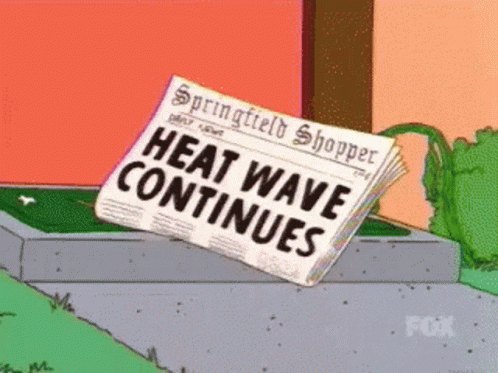
My Heatwave At 70
It’s important for seniors to remain physically and mentally active as they age. However, staying active during these hot summer months presents additional challenges. The heat and humidity can cause seniors to overexert themselves more easily. Here are some tips for seniors to stay active in the summer heat safely:
Plan Activities for Cooler Times of Day
The midday sun from 10am-4pm tends to be the hottest part of the day in the summer. Senior citizens should aim to do outdoor activities like walking, gardening or golf very early in the morning before the sun is high, or later in the evening as the sun descends. Activities in natural shade or that involve water are also good options when it’s hottest.

Stay Hydrated and Monitor Fluid Intake
Dehydration is a serious risk in hot weather, so seniors need to drink plenty of w ater before, during and after any outdoor activity in the heat. Thirst isn’t always a reliable indicator of dehydration as we age, so aim to drink around a glass of water every 20 minutes of activity or labor outside. Water is best, but electrolyte sports drinks can also help replace what’s lost through sweat. Limiting caffeine and alcohol which can increase dehydration risk is also wise.
Pick Lower-Intensity Activities
Vigorous activities that drive up heart rate and sweating should be avoided during periods of extreme heat risk. Gentler options like tai chi, yoga, walking, swimming or water aerobics are better choices that won’t overtax the body. Garden or do light house or yard work in short bursts with plenty of shade and hydration breaks. Save more intense activities for cooler months.
Pick Lower-Intensity Activities
Vigorous activities that drive up heart rate and sweating should be avoided during periods of extreme heat risk. Gentler options like tai chi, yoga, walking, swimming or water aerobics are better choices that won’t overtax the body. Garden or do light house or yard work in short bursts with plenty of shade and hydration breaks. Save more intense activities for cooler months.

Consider Access to Air Conditioning
When doing indoor activities in non-air conditioned buildings like exercise classes, make sure you have access to air conditioning before and after the class so your body can properly recover and cool down. Activities in temperature-controlled environments are optimal to prevent heat illnesses when the mercury rises substantially.
Watch for Common Heat-Related Issues
Seniors should stay alert for signs of heat exhaustion like heavy sweating, dizziness, tiredness and nausea during activities or labor in hot weather. If any concerning symptoms occur, stop the activity immediately, move to a shaded or air-conditioned area, drink hydrating fluids and rest. Call medical help right away if symptoms don’t improve rapidly or heat stroke with vomiting or confusion sets in. Prevention is vital during heat waves.
Use Sun Protection Religiously
Sun exposure augments dehydration and heat-related risks, so seniors should apply broad spectrum sunscreen with at least SPF 30 before going outdoors and reapply every two hours. Also wear loose, light colored, breathable fabrics and hats or caps with brims to shield the head, neck and shoulders from direct sun rays. Sunglasses help protect aging eyes from sun damage too.

Try Pool or Water Exercise
Aquatic exercise classes and water aerobics are excellent options for staying active and cooling off at the same time in the summer heat. Water helps draw heat away from the body 25x faster than air. Many community pools and aquatic centers offer low-impact senior-focused classes at convenient times. If a backyard pool is available, simply swimming laps provides excellent cardiovascular exercise.
Consider Cooling Gear and Shade Structures
For outdoor projects and activities, seniors can invest in lightweight cooling neck gaiters, wristbands, headwear or scarves that utilize evaporation to lower body temperature. Portable misting fans or pop-up canopies and umbrellas placed in strategic areas of the yard or garden offer welcome sun and heat relief too for rest breaks. Staying cool makes activities safer in the hottest months.
Prioritize Indoor or Shaded Options\
When temperatures soar substantially, seniors should prioritize indoor activity options that don’t risk heat illness like yoga videos at home, mall walking groups, senior fitness classes at a gym or community center, playing games like cards or Nintendo Wii with friends and virtual activities on FaceTime or Zoom. Shaded areas or structures outdoors may still allow for walking, gardening or light projects if well-hydrated with breaks. Consult the local heat advisory before deciding the risk level of activities outdoors.
In summary, senior citizens can focus on low-impact choices done in cooler parts of the day or protected indoor environments when temperatures spike in the summer. Staying hydrated, keeping cool and limiting direct sun exposure are essential to continue active aging safely in hot weather. With adjustments to timing, intensity and added protections, seniors don’t need to become less active but rather modify their routines slightly for well-being during heat waves.

